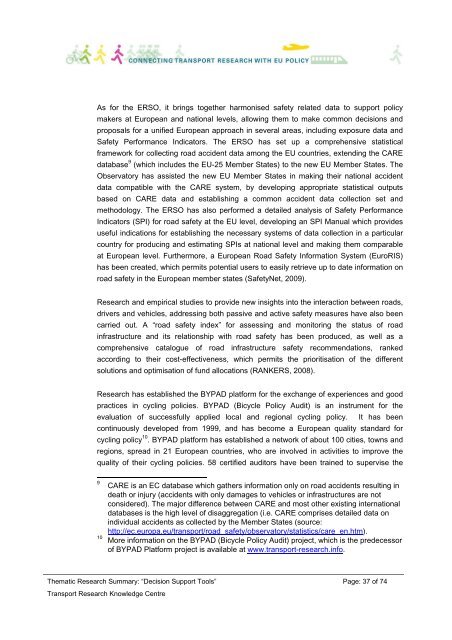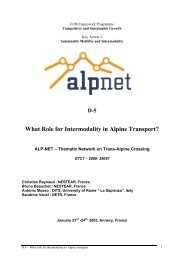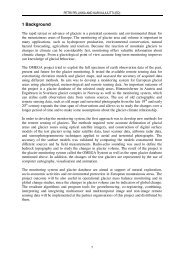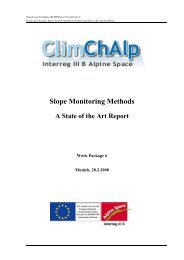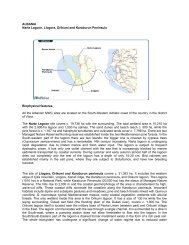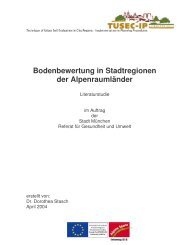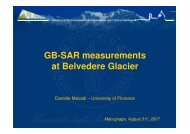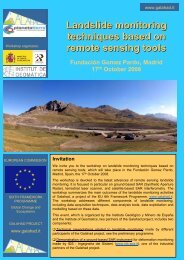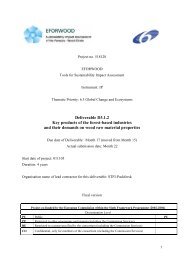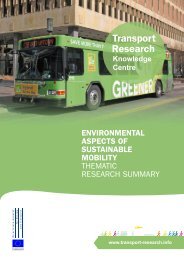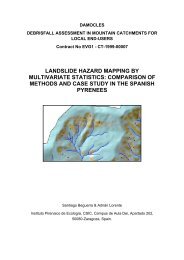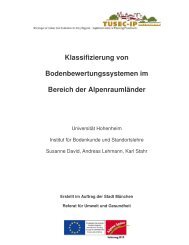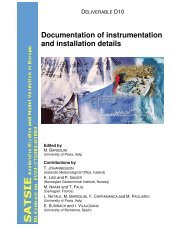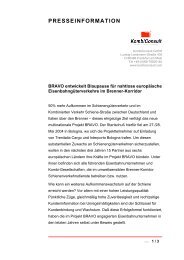Decision Support Tools - Thematic Research Summary - Transport ...
Decision Support Tools - Thematic Research Summary - Transport ...
Decision Support Tools - Thematic Research Summary - Transport ...
You also want an ePaper? Increase the reach of your titles
YUMPU automatically turns print PDFs into web optimized ePapers that Google loves.
As for the ERSO, it brings together harmonised safety related data to support policymakers at European and national levels, allowing them to make common decisions andproposals for a unified European approach in several areas, including exposure data andSafety Performance Indicators. The ERSO has set up a comprehensive statisticalframework for collecting road accident data among the EU countries, extending the CAREdatabase 9 (which includes the EU-25 Member States) to the new EU Member States. TheObservatory has assisted the new EU Member States in making their national accidentdata compatible with the CARE system, by developing appropriate statistical outputsbased on CARE data and establishing a common accident data collection set andmethodology. The ERSO has also performed a detailed analysis of Safety PerformanceIndicators (SPI) for road safety at the EU level, developing an SPI Manual which providesuseful indications for establishing the necessary systems of data collection in a particularcountry for producing and estimating SPIs at national level and making them comparableat European level. Furthermore, a European Road Safety Information System (EuroRIS)has been created, which permits potential users to easily retrieve up to date information onroad safety in the European member states (SafetyNet, 2009).<strong>Research</strong> and empirical studies to provide new insights into the interaction between roads,drivers and vehicles, addressing both passive and active safety measures have also beencarried out. A “road safety index” for assessing and monitoring the status of roadinfrastructure and its relationship with road safety has been produced, as well as acomprehensive catalogue of road infrastructure safety recommendations, rankedaccording to their cost-effectiveness, which permits the prioritisation of the differentsolutions and optimisation of fund allocations (RANKERS, 2008).<strong>Research</strong> has established the BYPAD platform for the exchange of experiences and goodpractices in cycling policies. BYPAD (Bicycle Policy Audit) is an instrument for theevaluation of successfully applied local and regional cycling policy. It has beencontinuously developed from 1999, and has become a European quality standard forcycling policy 10 . BYPAD platform has established a network of about 100 cities, towns andregions, spread in 21 European countries, who are involved in activities to improve thequality of their cycling policies. 58 certified auditors have been trained to supervise the9CARE is an EC database which gathers information only on road accidents resulting indeath or injury (accidents with only damages to vehicles or infrastructures are notconsidered). The major difference between CARE and most other existing internationaldatabases is the high level of disaggregation (i.e. CARE comprises detailed data onindividual accidents as collected by the Member States (source:http://ec.europa.eu/transport/road_safety/observatory/statistics/care_en.htm).10 More information on the BYPAD (Bicycle Policy Audit) project, which is the predecessorof BYPAD Platform project is available at www.transport-research.info.<strong>Thematic</strong> <strong>Research</strong> <strong>Summary</strong>: “<strong>Decision</strong> <strong>Support</strong> <strong>Tools</strong>” Page: 37 of 74<strong>Transport</strong> <strong>Research</strong> Knowledge Centre


